
7/30/2005
7/28/2005
American Life in Poetry: Column 018
BY TED KOOSER, U.S. POET LAUREATE
Every reader of this column has at one time felt
the frightening and paralyzing powerlessness of
being a small child, unable to find a way to
repair the world. Here the California poet,
Dan Gerber, steps into memory to capture such a moment.
The Rain Poured Down
My mother weeping
in the dark hallway, in the arms of a man,
not my father,
as I sat at the top of the stairs unnoticed--
my mother weeping and pleading for what I didn't know
then and can still only imagine--
for things to be somehow other than they were,
not knowing what I would change,
for, or to, or why,
only that my mother was weeping
in the arms of a man not me,
and the rain brought down the winter sky
and hid me in the walls that looked on,
indifferent to my mother's weeping,
or mine,
in the rain that brought down the dark afternoon.
Dan Gerber's most recent book is "Trying to Catch the Horses"
(Michigan State University Press, 1999).
"The Rain Poured Down" copyright (c) 2005 by Dan Gerber
and reprinted by permission of the author.
This weekly column is supported by The Poetry Foundation,
The Library of Congress, and the Department of English
at the University of Nebraska, Lincoln. This column does not
accept unsolicited poetry.
******************************
7/25/2005
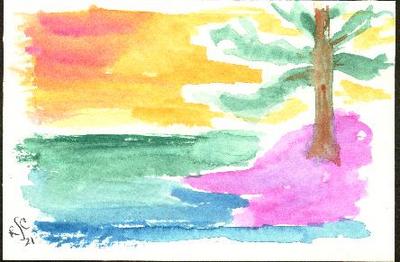
by Susan Elbe
Miracles Enough
Evening, russet as an old penny, drops into our open hands.
A loon cry arcs across wet air,
full of copper and fog.
Here I am, here. Another calls. Here, I am here.
Back and forth they yodel,
flipping the bright coins of their want into the fading light.
Out of the long grass, the moon, enormous, paper-white
rises and breaks tether, weightless as a summer kite.
But we want more. We want miracles,
to hang on the sleeve of heaven and witness miracles.
Deep-sea divers film a cormorant 300 feet down,
a depth where water weighs enough to crush human lungs
and Russians, drilling the Antarctic ice cap,
find Lake Vostock two miles under glacial seal,
its warm and pristine water full of million-year-old microbes.
Even these are not enough. We want myth to manifest itself
beyond our own lives, to revision our beginnings—fish
who flung themselves onto the land and walked,
the wolf who howls inside the skins we wear like gloves,
the hard idiom of stars, eternity’s declension.
We want the hollow bones of birds who fly in water
to be the flutes we've forgotten how to play,
flutes to sing us through the deep and salty dark.
First appeared in Ascent (Vol. 26, Number 3, Spring 2002)
7/22/2005
by Robin Chapman
DYNAMICAL SYSTEMS
What’s not changing in time?
The glass in the window pane
sags slowly, the sunlight
streams through the glass, the cat
washes her face with her paw,
the house gathers dust motes,
the geraniums we brought in
before frost take root and flower.
Outside, a wind is blowing the leaves about.
The universe we once thought steady-state
is flying apart. Inside, we are waltzing,
laughing, to the music of the nickelharppe.
And you, reader, anchored by gravity
and oxygen and eye, thinking now
of the sky full of stars, dancing, house repairs–
what strange, unpredictable pattern is yours?
-from Images of a Complex World:
The Art and Poetry of Chaos (R. Chapman &
J.C. Sprott, Singapore: World Scientific, 2005).
First appeared in The Wisconsin Poets' Calendar:
2006.
7/20/2005
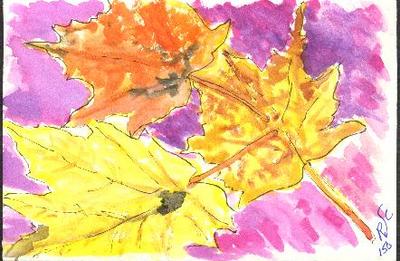
by Sandy Stark
Going to See the Cranes: for Gretchen Schoff
1
A few conversations, questions,
a book I pressed into your hand,
a note you wrote in return:
I thought this a modest exchange.
I planned to attend another class
you taught when I had time,
to send another poem
when I wrote one.
2
Now, on the day others meet
in your memory,
I go to see the cranes.
In the Baraboo hills the trees blaze
red and yellow and gold
against an October sky
that, as sure as this day is warm,
will bring a cold day tomorrow.
White-bellied birds rush out
from under a bridge
and over ruffled water below.
A row of trees turns
the narrow road into a golden lane,
paved with golden leaves.
3
The sun warms the air
and one large bumblebee,
taking its last, lazy taste of flight.
A sign says the fenced-in field
holds the African crowned cranes.
Instead, I walk to the circular house
at the top of a rise, and then,
as I arrive, the cranes
emerge from their pens,
feathers dripping from their sides,
and something wonderful begins:
from behind a hill,
the clatter of unpenned cranes--
bugler to bugler calls;
cranes in cages reply.
I see their bristled crowns
and downy throats rise;
they spread their enormous wings;
and then I hear them sing.
4
“You send me such lovely things,” you wrote.
I kept that little slip of paper for weeks,
pleased to give you something back.
But today, stopped in my tracks
in a circle of color and sound
I have perhaps found a better way
to thank you, by going to see
the red and gold and black-crowned cranes
who sing on an autumn day.
-published in The Wisconsin Academy Review, Spring 1996
7/19/2005
by Judith Strasser
Last Night at the Scottish Retreat
September 28, 2001
No matter that you are leaving
a castle without a moat,
dodgy beef,
sulphurous broccoli,
people still strange
after four weeks
of sharing the loo--
you don’t want to go.
The world has turned
wicked, and though
you were always at risk
in Scotland the mist
obscures the dust
and you think
you are probably safe
so long as you go
no further than Edinburgh.
Home means stories
your friends will tell,
echoes of terror,
and how you won’t
want to admit
thank god there was no TV.
Published in The Ledge, Spring-Summer 2005
7/18/2005
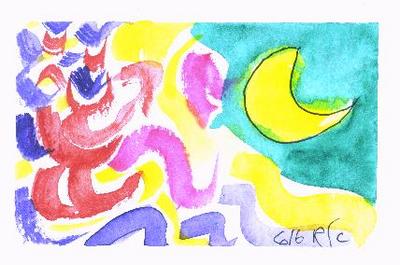
by Grace Cavalieri
Even If You Could Lick All The Words,
The Ink Will Never Fade
…John Yau
If you can write one good poem,
one you like, well
you can put any two things together and it’ll work
Two bad people can make a good marriage …
You can wear a backless dress to church
and sit in the front pew,
or plant two pounds of peas
in a one acre plot and not worry.
You can tell your sister to go marry the bum
You have better things to do.
You have written something on your desk that’ll stay there.
From Cuffed Frays (The Argonne House Press, c2001)
7/17/2005
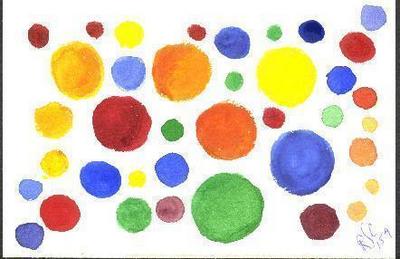
by Elisavietta Ritchie
MY DAUGHTER BORROWS TWO EGGS
To feed her new lover
oeuf a` la coque
with a rose in its mouth...
At a long ago breakfast
my father explained to my lover
the symbolism of eggs
"Fertility, hope, and perfection.
In gilded domes atop Russian churches
the Holy Trinity rolled into one."
What if, when the bells ring so hard
at midnight on Easter,
gold cupolas hatched into mystical roosters...
My father, ill and en route
to that perfect elliptical void,
has trouble spooning his morning egg.
Yet how much he could tell
of the liquid ovoid of loving,
fragile shells.
Still, today he bequeaths
to his waiting granddaughter
perfection, fertility, hope,
a remembered triad embedded
in two speckled X Large eggs
with golden yolks.
-from The Arc of the Storm (Signal Books). Originally appeared in New York Quarterly.
7/15/2005

American Life in Poetry: Column 016
BY TED KOOSER, U.S. POET LAUREATE
There are thousands upon thousands of poems about love, many of them using predictable words, predictable rhymes. Ho-hum. But here the Illinois poet Lisel Mueller talks about love in a totally fresh and new way, in terms of table salt.
Love Like Salt
It lies in our hands in crystals
too intricate to decipher
It goes into the skillet
without being given a second thought
It spills on the floor so fine
we step all over it
We carry a pinch behind each eyeball
It breaks out on our foreheads
We store it inside our bodies
in secret wineskins
At supper, we pass it around the table
talking of holidays and the sea.
Reprinted from "Alive Together: New and Selected Poems" (LSU Press, 1996) by permission of the author. Poem copyright (c) 1996 by Lisel Mueller. This weekly column is supported by The Poetry Foundation, The Library of Congress, and the Department of English at the University of Nebraska, Lincoln. This column does not accept unsolicited poetry.
7/14/2005
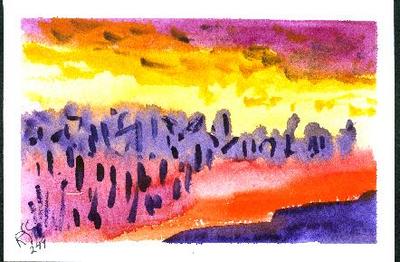
by Maxine Scates
Sweet
After the dying was over
when everything had been put away
when it came time to have something to say
no longer snarling behind the fence
could be
could be again,
the dog leaping in the field
beneath the blue butte
with the storm coming in
unsettling.
She found the mossy skull
of a doe and brought it to me.
This is absence
or so I thought
in the intricate sutures which had held,
the cavern of the eye
going back into itself and away.
Beneath the blue butte
the fences were fallen
the barbed wire useless,
who was I
tired then
in the muddy field
with the brown stalks
giving way to spring, who was I
if I was not who I had thought?
-from Black Loam. First appeared in The Women's Review of Books
7/13/2005

by CX Dillhunt
Scaffolding reaching
sky--Temple of Heaven still
under construction
Leaves changing red
blue green yellow along night's
neon city wall
Three cranes stretching
double yellow necks next to
wild goose pagoda
-- (Beijing/Xi'an 7/05)
7/12/2005
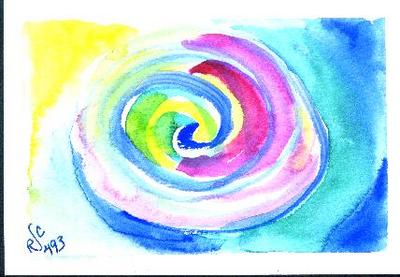
by Wilda Morris
Feet on the Subway
His coat was ragged
as his face. His worn hat
and threadbare gloves
could not protect him
from the icy cold racing
through the wind tunnels
of New York City.
Probably he panhandled
coins to ride the subway.
My eyes were drawn
from his drawn face,
his recessed eyes,
to the skin of his ankles
stretched tight and red,
his puffy feet, pressed
into loafers, the newspaper
stuffing visible through
large holes in the soles.
I shivered less from the cold
than the coldness
with which I stared.
I reached my station,
rose and left the subway car.
I took his feet with me.
Look, the swollen ankles,
the newspaper-stuffed shoes
are still stored
just behind
my eyes.
-Originally published in Christian Citizen in 2005.
7/11/2005
7/10/2005
UP NORTH
Snow. Like a million pinheads. Reuben looks
out the cafe window and says, "God's dandruff."
Everyone's having a swell time. Antlers
cradle a shotgun. The spoon in the manager's
hand shakes.
Reuben tilts the pinball machine. His eyes
shine like eyes of spotlighted deer,
like shotgun slugs, like two quarters.
Otto stutters Yankee Doodle on the harmonica.
Jacinda picks her nose, weaves a rug from napkins.
She is more beautiful than all the advertisements
of Kotex. She spits milkshake at the manager.
Reuben's last ball rolls between the flippers
of the pinball and touches nothing. He, Otto
and Jacinda turn their pockets inside out. Balls
of cotton fall. The manager's hands flutter
like wings of a dying marriage. "Wait," he says,
"I can show you the back of a brook trout. It
looks like lace."
Above, a steel moon rolls through clouds.
-originally appeared in The MidAtlantic Review
7/08/2005

American Life in Poetry: Column 015
BY TED KOOSER, U.S. POET LAUREATE
Many of us are collectors, attaching special meaning to the inanimate objects we acquire. Here, Texas poet Janet McCann gives us insight into the significance of one woman's collection. The abundance and variety of detail suggest the clutter of such a life.
The Woman Who Collects Noah's Arks
Has them in every room of her house,
wall hangings, statues, paintings, quilts and blankets,
ark lampshades, mobiles, Christmas tree ornaments,
t-shirts, sweaters, necklaces, books,
comics, a creamer, a sugar bowl, candles, napkins,
tea-towels and tea-tray, nightgown, pillow, lamp.
Animals two-by-two in plaster, wood,
fabric, oil paint, copper, glass, plastic, paper,
tinfoil, leather, mother-of-pearl, styrofoam,
clay, steel, rubber, wax, soap.
Why I cannot ask, though I would like
to know, the answer has to be simply
because. Because at night when she lies
with her husband in bed, the house rocks out
into the bay, the one that cuts in here to the flatlands
at the center of Texas. Because the whole wood structure
drifts off, out under the stars, beyond the last
lights, the two of them pitching and rolling
as it all heads seaward. Because they hear
trumpets and bellows from the farther rooms.
Because the sky blackens, but morning finds them always
safe on the raindrenched land,
bird on the windowsill.
Reprinted from PoemMemoirStory by permission of the author. Janet McCann's most recent book is "Emily's Dress" (Pecan Grove Press, 2005). Poem copyright (c) 2003 by Janet McCann. This weekly column is supported by The Poetry Foundation, The Library of Congress, and the Department of English at the University of Nebraska, Lincoln. This column does not accept unsolicited poetry.
7/03/2005

American Life in Poetry: Column 014
BY TED KOOSER, U.S. POET LAUREATE
Often everyday experiences provide poets
with inspiration. Here Georgiana Cohen
observes a woman looking out her window
and compares the woman to the sunset. The
woman's "slumped" chin, the fence that
separates them, and the "beached" cars set
the poem's tone; this is clearly not a
celebration of the neighborhood. Yet by
turning to clouds, sky, and breath, Cohen
underscores the scene's fragile grace.
Old Woman in a Housecoat
An old woman in
a floor-length housecoat
has become sunset
to me, west-facing.
Turquoise, sage, or rose,
she leans out of her
second floor window,
chin slumped in her palm,
and gazes at the
fenced property line
between us, the cars
beached in the driveway,
the creeping slide of
light across shingles.
When the window shuts,
dusk becomes blush and
bruises, projected
on vinyl siding.
Housecoats breathe across
the sky like frail clouds.
Reprinted from "Cream City Review," 2004,
by permission of the author, a writer and
journalist living in Boston. Â Poem
copyright 2004 by Georgiana Cohen.
This weekly column is supported by The Poetry
Foundation, The Library of Congress, and
the Department of English at the University
of Nebraska, Lincoln. This column does not
accept unsolicited poetry.
7/02/2005
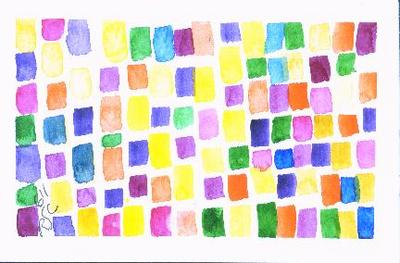
by Sandy Stark
The Doctor Visits the Prayer Flags
On the first day of the month of March
the doctor visits the prayer flags.
He is interested in their personal history—
what they’re made of, who made them,
how long they’ll last.
Together we note their color, condition,
shape, and likely longevity.
We examine them from a distance,
through the windows that look out to the yard,
the bright flags pinned fast to the line
I tied between two trees near the garden,
still frozen and cold and hard.
On the table between us
the long green stalk of an amaryllis
ends in a single bud that just this morning
has started to open,
its color unfurling within.
The doctor has been out of town.
He says this morning’s snow
reminds him of airports and airplanes,
of arrivals and departures, and time
spent away from home.
We watch the flags fly sideways in the wind.
Call me before you take the flags down,
he says; I’d like to look at them again.
-published in The International
Breast Cancer Research Foundation
newsletter, 2000




